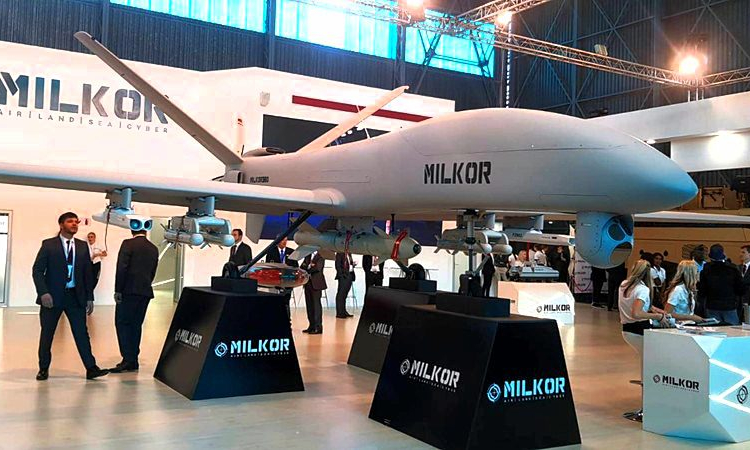South African defense company Milkor is in advanced negotiations with Saudi Arabia over a potential order for its 380 Unmanned Combat Aerial Vehicle (UCAV), which the company says it can fully assemble and manufacture in the kingdom.
The 380 drone, which made its debut flight in September 2023, is a Medium Altitude Long Endurance (MALE) class aircraft that can carry a variety of weapons and sensors for surveillance, reconnaissance and strike missions.
Milkor’s business development manager Harry Cassidy told Breaking Defense that the company has received a “manufacturing permit” from Saudi Arabia that allows it to set up a local production facility in Riyadh, should the deal go through.
“We are in talks on procurement with high-level Saudi Arabian officials,” Cassidy said. “We have a local office [in Riyadh], which could support full assembly and production.”
Cassidy added that the company is also looking to expand its presence in the Middle East and Europe, and plans to “set up shop” in the United Arab Emirates, another potential customer for the 380 drone.
Saudi Arabia and the UAE are both pursuing domestic defense industries as part of their Vision 2030 initiatives, and have shown interest in acquiring advanced drones from various sources.
The 380 drone was displayed at the World Defense Show in Riyadh with Saudi Arabian markings for the first time, armed with Halcon Desert Sting guided bombs and Al Tariq precision guided weapons. It was also equipped with the L3Harris MX-15 Electro Optical/Infrared (EO/IR) gimbal.
The Milkor 380 has a wingspan of nearly 60 feet, a maximum take-off weight of 1,500 kilograms, and an endurance of up to 30 hours. It is a “multi-functional airborne platform that can be used for surveillance, reconnaissance and opportunistic engagement operations.”
Unveiled in 2018, the Milkor 380 embarked on taxi testing earlier last year. Specifically engineered for extended Intelligence, Surveillance, Target Acquisition, and Reconnaissance (ISTAR) missions, the Milkor 380 is designed to accommodate an external payload of 210 kilograms, which includes an assortment of weapons and sensors. Notable examples of these include the Al Tariq X-series precision guided munitions, Halcon Desert Sting DS-16 guided bombs, FZ602 laser-guided rocket launchers, an L3-Harris gimbal, and Airborne Technologies’ Self Contained Aerial Reconnaissance (SCAR) Pod.
Cassidy said that Milkor is in talks with multiple governments regarding 380 sales and is ready to export the drone soon. He also said that the company has the flexibility to scale up its production capacity if needed.
So far, Milkor has produced three 380 aircraft at its Cape Town facility, with a fourth and a fifth under construction. The company is also running a flight test program near a South African Air Force base outside Cape Town, which will continue throughout 2024.
Cassidy said that the company is busy integrating Halcon’s Desert Sting 16 (DS-16) guided bombs and Thales FZ602 laser guided rockets, after signing Memorandum of Understanding agreements with the two weapon suppliers. Halcon is a subsidiary of the Emirati defense conglomerate EDGE Group.
The 380 drone could boost Saudi Arabia’s military capabilities amid heightened geopolitical tensions in the Middle East, where the kingdom is involved in a proxy war with Iran and its allies. Saudi Arabia has been leading a coalition of Arab states in a military intervention in Yemen since 2015, against the Iran-backed Houthi rebels who have seized control of large parts of the country.
South Africa has a long history of exporting military equipment to Saudi Arabia and the UAE, including for use in Yemen. A Daily Maverick report from August 2023 found that Pretoria had approved arms exports worth 9.2 billion rand ($483 million) to Riyadh and Abu Dhabi, much of which was used in Yemen against the Houthis.
However, the 380 drone still needs to obtain a military type certification from South African authorities before it can conduct test firings of its armaments, Cassidy said.
Cassidy said certification approval is underway but didn’t disclose a fixed timeline for a decision to be made.
He also shared that a 380 customer demonstration will take place in the “first half” of 2024. Cassidy declined to comment on a specific cost of the aircraft but said it is “reasonably priced.”





